-
Genealogy & Names
-
Tourist Information
-
Culture & Reference
CHRISTMAS GIFTS FROM IRELAND - VISIT IrishNation.com Only 12 Days To Go! |
|
July 2019 
Landscape in Ireland image from Free Photos Of Ireland |

|
|

| Popular Articles from Recent Newsletters: |


|
The American industrialist Andrew Carnegie (1835-1919), is to be honored in Ireland with the release of a set of stamps featuring four of the many libraries he funded in this country. 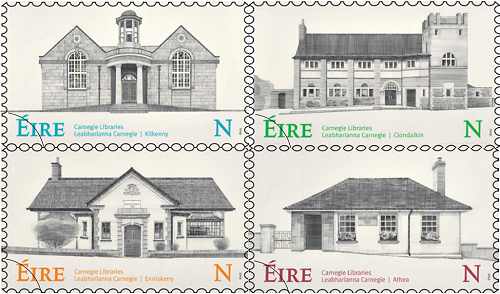
Carnegie was a Scottish-American businessman and philanthropist who developed the US steel industry in the second half of the nineteenth century and who became one of the richest men in American history. He famously wrote 'The Gospel of Wealth' in 1889 which encouraged those with massive fortunes to give back to society and thus instigated a wave of philanthropy. In Ireland Carnegie is best remembered for funding 66 libraries, of which 62 are still in use. In fact he funded over 1200 libraries worldwide. The commemorative stamps display the Irish libraries at Kilkenny, Clondalkin in Dublin, Enniskerry in Wicklow and Athea in Limerick. The chairman of the Irish Post Office stamps authority unveiled the stamps at another Carnegie library on Pearse Street in the heart of Dublin City. Quoting Carnegie he remarked: 'surplus wealth is a sacred trust which its possessor is bound to administer in his lifetime for the good of the community.' |

|
The appointment of a new British Primer Minister in Westminster has done little to quell the seemingly permanent paranoia surrounding Brexit. 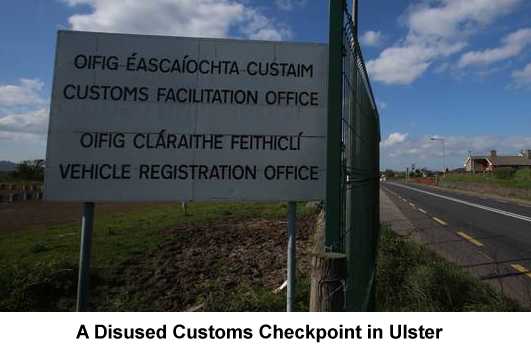
Brexit is the decision by the United Kingdom to leave the European Union. Aside from the economic problems and issues that need to be resolved before this divorce can actually take place, there is the huge political matter of Northern Ireland to consider. Despite the fact that a majority of voters in both Northern Ireland and Scotland each voted to remain within the EU, both of those territories are to be ripped out of the EU by virtue of their being part of the United Kingdom. The consequences in Ulster are particularly difficult as the border between the six Counties that comprise Northern Ireland and the Republic of Ireland to the south will represent the biggest land border between the UK and the EU. A 'hard border' is expected to be installed but this will be in contravention of the 'Good Friday Agreement' which saw an end to paramilitary violence in Ulster and the establishment of a self-determining parliament at Stormont. The border between the north and south was also removed as part of the agreement. The new British Primer Minister Boris Johnson has shown little interest in addressing this thorny issue and, given that he badly needs the support of Unionist M.P.'s in the London Parliament it seems he is content to allow the clock to run out on the October 31st deadline when the UK will formally leave the EU. Whether he is allowed or able to do this without an EU-UK divorce deal being agreed in advance remains to be seen. |

|
FIND YOUR NAME IN OUR GALLERY OF IRISH COATS OF ARMS

|

|
by Pat Watson 'This is your final warning, if you are late one more morning you will be dismissed.' That's what the stationmaster at Kings Cross railway station said to Timmy. 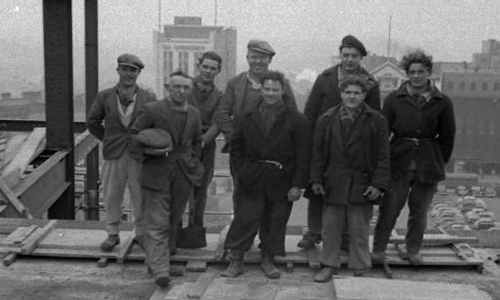
In 1957 Timmy had come to London with another twenty-five thousand young Irishmen. Most of the others were big, strong muscular men who were willing and able to work as navies with Wimpeys or McAlpines. Timmy alas was weak, lanky, lean and lazy. 'Avoid hard work, you're not able for it,' that's what his mother always told him. In this he always obeyed her. That was why he avoided the building sites and got a job with British Rail. Now he was on his final warning. He shared the digs with three Wimpies, a bed in each corner of the big room on the third floor. In the other big room across the hall were four big Kerry McAlpines. All eight shared the tiny kitchen, the radio, the banter and several pints each, nightly. Unfortunately Timmy's starting time was six am while the navies started at eight. Now he was on his last chance. You need one of these alarm clocks with two bells on top with a little hammer that bangs over and back between them. Place it in a tin basin to double the noise - it would waken the dead, that's what his friends told him. Get it today tomorrow will be too late. He found the clock easy enough but the basin that was a different thing. If you were in Mohill or Coothill or Summerhill you'd have no bother buying a tin basin but in London you won't find a tin basin in Harrods window or any other high street window for that matter. Pronouncing it 'bashin' wouldn't help your cause either. However he persisted and finally was on his way home with the basin wrapped in brown paper under one arm and the hammer clock held by its carrying handle in the other hand. Then he met the two Cavan girls, the big one and the little one, Mary and Mona. They lived next door. 'Are you going to make a bomb with the clock?' said Mary. 'Give it to me and I'll put it inside my coat.' All three got on the busy tube train, Timmy sat in the middle, the big girl sat on his right and he put the basin upside down on his left to give the small girl a lift. When she sat the basin dinged a little with a plonking sound. Unfortunately she was suffering from severe hiccups, each of which was followed by a double plonking of the basin. It would have been worse if it had been the big girl as she had a smoker's cough. Opposite sat two Cockney gentlemen, drivers of the famous black taxis, on their way home. They were greatly amused by the antics of the 'Oirish' and one of them said to Mary as she coughed, 'Cough it up mate it might be a watch.' 'No it's a clock,' she said as she pulled out the clock. That shook him and all the carriage laughed loudly at him. Just as the Cockneys turned nasty with racist remarks the train stopped at the Tottenham Court Road and the three Wimpies got on and threw off the two Cockneys. That settled that. Now that he was sure of being wakened in the morning Timmy and his friends celebrated well and fell into bed after midnight. The clock in the basin was even better than expected. At five am all hell broke loose, Timmy thought the war had started in his head, the devil of a clock was jumping round the basin clamoring for action, he picked it up and hurled it at the wall only there was no wall there, just a window. If you are driving a black taxi in London at five in the morning what are the chances of being hit by a flying clock? When last seen Timmy was clambering over back-garden walls in Camden Town in his pajamas pursued by a very angry taxi man. Pat Watson 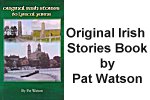
'The Alarm Clock' is one of sixty lyrical yarns from 'Original Irish Stories' by Pat Watson, Creagh, Bealnamulla, Athlone, Ireland. Visit: https://goo.gl/FDp48v or you can email the author here: pjwatson77@gmail.com |


find out more |

|
by Danny Allsopp If ever the Fates of mythological fame ever weaved the extraordinary destinies of men, the Waterford born Thomas Francis Meagher would have to rank up there with the best of them. 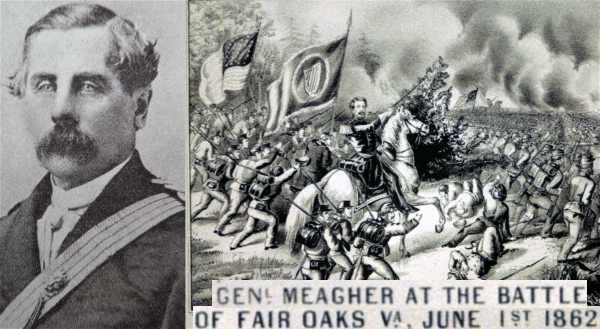 Even Waterford itself had a colourful history: from the Deisii chieftain, Aengus who had his scuffle with Cormac Mac Art; to Aengus and his clan being exiled, but assisted the Munster King to gain territories in what is now known as Waterford to the outside world. Saint Mochuda, in the first part of the 7th century, thanks to the King of the Deisii, established a church at Lismore in Waterford. The Danes arrived at Waterford in the early 10th century and established Viking settlements mid-century. Brian Boru, in the early part of the next century even utilised the Norsemen from, amongst other places, Waterford, to man his ships to raid parts of Britain.
Even Waterford itself had a colourful history: from the Deisii chieftain, Aengus who had his scuffle with Cormac Mac Art; to Aengus and his clan being exiled, but assisted the Munster King to gain territories in what is now known as Waterford to the outside world. Saint Mochuda, in the first part of the 7th century, thanks to the King of the Deisii, established a church at Lismore in Waterford. The Danes arrived at Waterford in the early 10th century and established Viking settlements mid-century. Brian Boru, in the early part of the next century even utilised the Norsemen from, amongst other places, Waterford, to man his ships to raid parts of Britain.
From Waterford's remarkable history, we see the birth of Thomas Meagher 3rd August 1823. His father was a successful merchant and mayor which resulted in Thomas being well educated at Clengowes by Irish Jesuits and at Stonyhurst College, Lancashire. In 1843 he was a law student in Dublin and became a skilled orator and debater. He also joined the Repeal Association to pursue Ireland's independence, but in 1845 became more involved with the more militant wing called Young Ireland. This new wing would split with the older Association's more peaceful stance, precipitated by Meagher's 'sword speech' at the Peace Resolutions debate between the two factions; this debate lasted for two fierce days in 1846. The renowned Dan O'Connell's son, John, interrupted Meagher's speech declaring that he could not listen to his words and would leave. However, rather than have O'Connell leave, Meagher and his leading associates and other members of Young Ireland left instead. These revolutionaries seeking independence for Ireland from Britain did not go unnoticed by the British Government. The Government acted and arrested Meagher and his colleagues, William Smith O'Brien and John Mitchel on charges of sedition in an attempt to prevent these men from starting a possible rebellion. Fortunately, for Meagher and O'Brien, the British did not stack the jury, which was their usual practice. As a result, these two patriots were not convicted. When it was Mitchel's turn, the prosecution this time made sure there were no Catholics or independent-minded Protestants. Consequently, Mitchell was sentenced to 14 years transportation beyond the sea; the trumped-up charge was treason, but in reality, he was a believer in freedom for Ireland. The Irish papers became even more revolutionary with their articles with the editors of three of the main newspapers being arrested and warrants being issued for Meagher and O'Brien. In 1848, the leaders of Young Ireland then rebelled with force with the view of ridding Ireland of British rule. Sadly, the rebellion was put down and Meagher, along with other leaders of the movement were sentenced by the usual British ludicrous trials. Meagher was sentenced to death but commuted the punishment to life transportation to Van Diemen's Land (Tasmania). Other leaders were issued the same sentence: O'Brien, Mitchel and others as gentlemen prisoners. They sailed on the Swift and arrived in Hobart in October 1849. Collectively, they were men of standing, intellectuals and had the desire to return as soon as they could to either Ireland or America, where there was plenty of anti-British opinions. Meagher married Catherine Bennett whilst on parole in 1851. They had a son in 1852, but he died at just four months old. Some of the rebels stayed, but in Meagher's case, he escaped to New York in 1852. Whilst in Tasmania, he wrote under the name of O'Meagher the words that this place 'has not separated me from my beautiful sad old country. I am still with her.' Catherine would later join him; however, she returned to Ireland an died at Waterford in 1854. Meagher would marry again to Elizabeth Townsend in 1856. The American Civil War started in 1861, and by this time, Meagher was a well-respected lawyer and newspaper editor for his founding paper, the Irish News in the Irish-American community. He helped raise a company of the 69th New York State Militia and held the rank of captain. They fought at the first Battle of Bull Run (Manassas) in July 1861 with Meagher and his men being praised for their battle gallantry. That is quite something considering the Confederates forced the Union Army to retreat in defeat. Meagher was a clever fellow and saw this war as an ideal opportunity for his fellow Irishmen to gain military experience that may later be utilised in gaining Ireland's freedom. He can be quoted as saying: 'Today it is for the American Republic we fight, tomorrow it will be for Ireland." He also realised that America protected the Irish from British persecution. Meagher would eventually become a Brigadier General for the infantry Irish Brigade. Whilst this brigade was mainly Irish, the ranks were also strengthened, as time went by, with new Irish immigrants and non-Irish from Massachusetts. One may have expected some shortfall in their unity with the veterans, but Meagher's experience came through by appealing to the pride of each of his collection of men; this worked very well. Later on, he highly praised the Massachusetts men for their bravery in battle. The 116th Pennsylvania also joined the Irish Brigade. General Meagher made a point of coming out and personally welcoming non-Irish regiments to his brigade. Unfortunately, as the war progressed, regiments were re-shuffled, and the Irish Brigade's strength was reduced to less than a regiment. In disgust Meagher resigned. He and his brigade fought in some of the fiercest battles of this war: Bull Run as mentioned above, but also the Peninsula Campaign, Antietam, Fredericksburg and Chancellorsville. Antietam incidentally saw the highest number of deaths in a day than any other battle in one day of this war. After the Civil War, Meagher went on to become the acting governor of Montana Territory. On 1st July 1867, he mysteriously drowned after falling from a steamer that was docked at Fort Benton Montana into the Missouri River; his body was never found. |

|
||||

|
by Shaun Ivory It started I suppose in 1941, with me Da, forever engrossed in his Sunday Express war map, muttering morosely about something called 'a second front'. Then along came the late Spring of '43, and with it Laurence Olivier, to fight the French at Enniskerry. 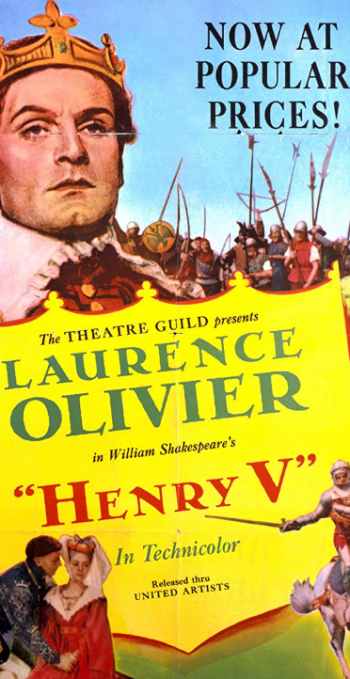 Suddenly the meaning of fighting two wars at once took on real meaning. The invasion of J. Arthur Rank's army to film the making of Henry V drove everything else off the local front pages. Another request for volunteers went out, this time to be English, Welsh or French! Oh, to be in Wicklow now that filming's here.
Suddenly the meaning of fighting two wars at once took on real meaning. The invasion of J. Arthur Rank's army to film the making of Henry V drove everything else off the local front pages. Another request for volunteers went out, this time to be English, Welsh or French! Oh, to be in Wicklow now that filming's here.
Nearly 800 bearded allsorts flooded in from the 26 counties, lured by the prospect of unsuppressed aggression at a handsome rate of pay, not to mention those long-festering feuds to settle. Talk about licence to kill! There hadn't been this much excitement since Dargan's railway came to Bray and it seemed that nobody was left untouched by the occasion. Mr Troy's single taxi's mileage must have at least equalled one circumference of the globe in those brief few months. The logistical nightmare of providing the weekly ratio of 20,000 eggs, 500 gallons of milk, five and a half thousand pounds of meat and almost as many cabbages deserved a film on its own. Wilfred Riordan the chief cook and battle watcher, wasn't concerned so much with a balanced diet as balancing his budget. And then there was the heightened awareness of the technical side of filming; people at bus stands could be heard discussing clapper boards, tracking shots and losing the light. Others, with even the slightest resemblance to Errol Flynn or Basil Rathbone in a bad light, could be found hamming it up outrageously, each wannabe film star attracting his own retinue of admirers. The Irish Army were dragooned into service as archers, which didn't sit well with the incoming mercenaries. Why weren't these guardians of the state hunting down the spies that every other citizen seemed to have seen parachuting out of leaden skies; or looking for crashed aircraft, instead of stealing army rations? Didn't they know there was a war on? The set began to look like a Wild West frontier town, with muddy streets, tents, forges, horses tied to hitching rails, snorting and prancing and doing those other things horses do when nervous and frightened. The keen gardeners among the extras were in hog heaven as they filled their sacks with fresh horse manure at close of day...but had great difficulty finding transport home! But then the casualty figures began to come in. Bernie Moore's horse rolled on him, three fingernails were torn nocking arrows, some disaffected serf decided to use real – well, tin - arrowheads when he discovered the chain mail was really only wool, knitted by the Blind School and sprayed silver. Even King Henry suffered a cut lip when - in his other role as director - took too long looking through his viewfinder and was trampled by the French cavalry. For a few days Mr Olivier had to use cupped hands to give directions and leave his megaphone in the trailer. After each day's shooting the real hostilities began... in the village's three drinking establishments. It seems the actors' pay scale was - how shall we say? - inequitable. Horsemen 1 per day, footmen ten bob. With a weekly payroll of 2,000 to be disbursed this was a serious dilemma. A recipe for an even greater battle, this potentially inflammable situation was only defused with threats that their common enemy - the archers, i.e., the army - might enter the fray. Thus a truly Irish solution emerged; that the combatants agree to only use the pubs on alternate evenings. Oh, and they got to keep their weapons when the Battle of Agincourt was over! There was hardly a house, hotel or garden shed that didn't proudly display a souvenir when the field of battle was finally deserted. The 1940s equivalent of establishing one's 'street cred'. Been there, done that, got the chain mail (!) shirt to prove it. But subsequent disability claims at Bray Labour Exchange for injuries received during military service were greeted with a tin ear. It did all come out right in the end, of course, the best stories usually do. For such a truly remarkable victory (and even despite some Hollywood investment), for once the script did agree with history! |

View the Archive of Irish Phrases here: http://www.ireland-information.com/irishphrases.htm |

|
The winner was: Rubylouise8@gmail.com who will receive the following: A Single Family Crest Print (usually US$24.99) Send us an email to claim your print, and well done! Remember that all subscribers to this newsletter are automatically entered into the competition every time. I hope that you have enjoyed this issue! 
by Michael Green, Editor, The Information about Ireland Site. http://www.ireland-information.com Contact us (C) Copyright - The Information about Ireland Site, 2019. 17 Páirc Ghrainbhil, Carraig Dubh, Contae Baile átha Cliath, Ireland Tel: 353 1 2893860 |

|
MARVELOUS GIFTS FOR ANY OCCASION FREE DELIVERY TO YOUR DOOR 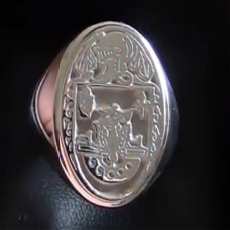
BIG REDUCTIONS! Stunning Family Crest Signet and Seal Rings 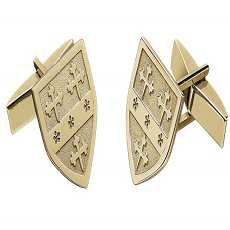
DISCOUNTED FOR A LIMITED TIME Elegant Cufflinks 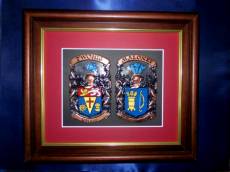
Incredible Family Crest Plaques Made in Ireland 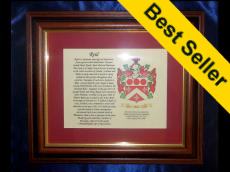
Superior Framed Family Crest Parchments 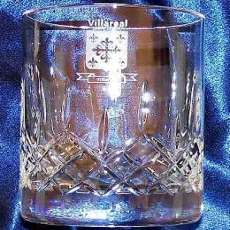
Gorgeous Glistening Galway Crystal 'Your-Name' Old Irish Sign NEW DESIGNS! 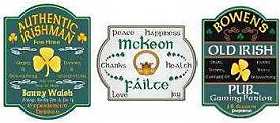
From US$34.99 - Free Delivery 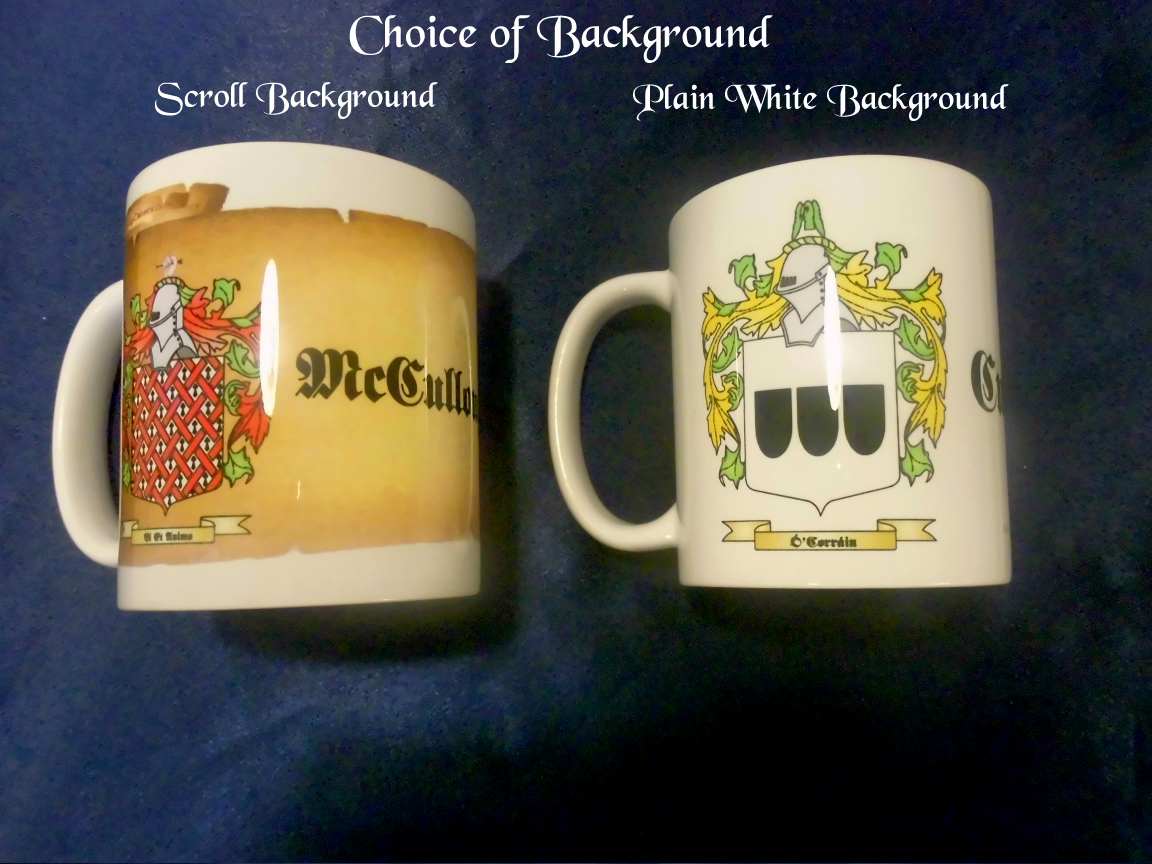
New Designs available on our Coffee Mugs 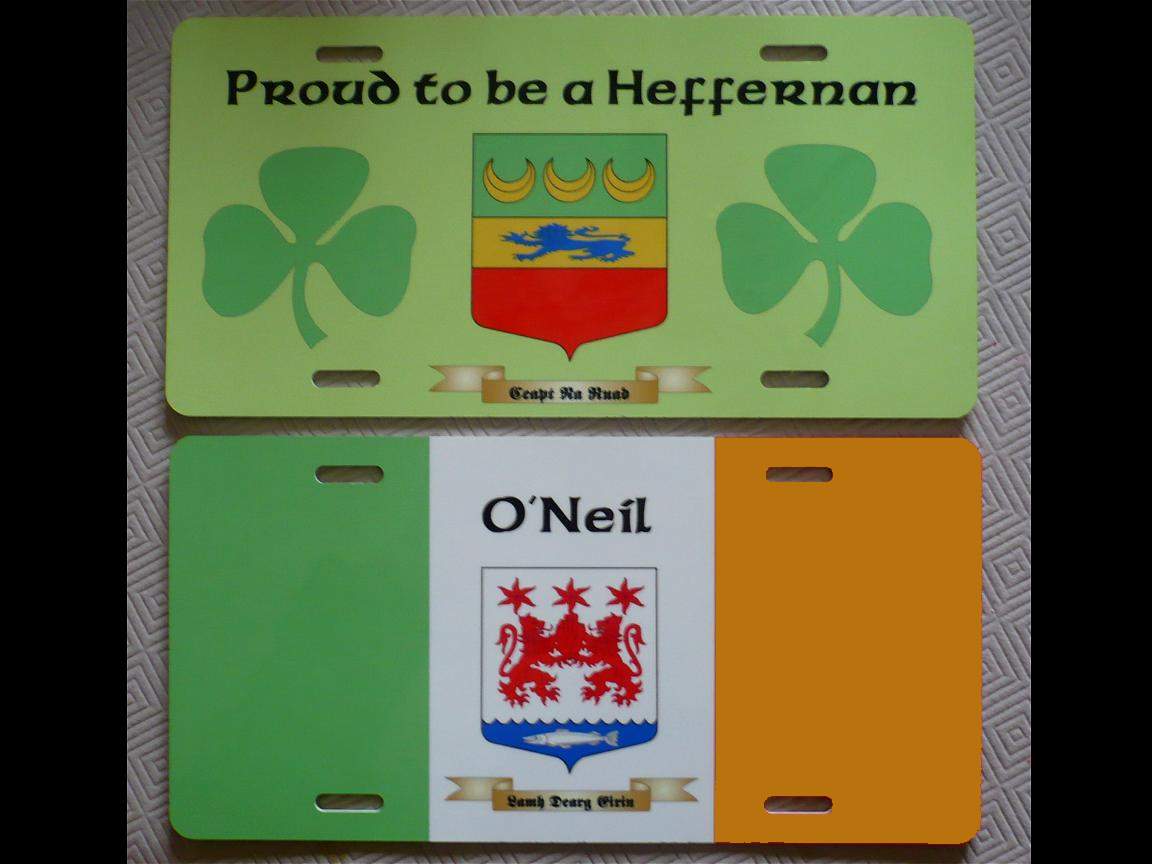
Personalized Licence Plate 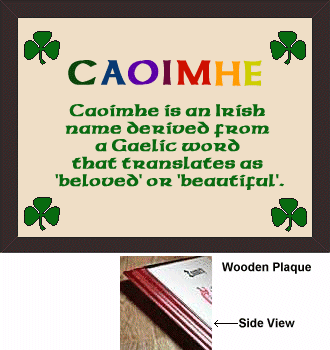
Personalized First Name Plaque. Great for Kids! 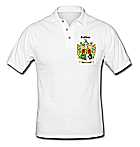
'Your-Name' Polo & Tee Shirts 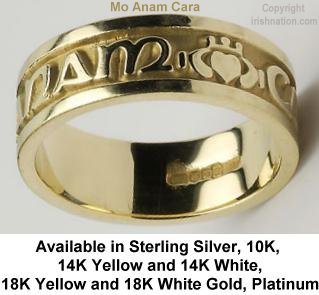
From US$69 Delivered BIG REDUCTIONS! Stunning Engraved Rings from Ireland with Irish Language Phrases. Mo Anam Cara: My Soul Mate Gra Dilseacht Cairdeas: Love, Loyalty, Friendship Gra Go Deo: Love Forever Gra Geal Mo Chroi: Bright Love of my Heart SEE MORE GREAT OFFERS AND DISCOUNTS AT: IRISHNATION.COM FREE DELIVERY FOR A LIMITED TIME! |
